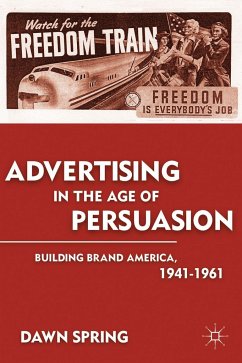Advertising in the Age of Persuasion documents and analyzes the implementation of the American strategy of consumerism during the 1940s and 1950s, and its ongoing ramifications. Beginning with World War II, and girded by the Cold War, American advertisers, brand name corporations, and representatives of the federal government institutionalized a system of consumer capitalism which they called free enterprise. In their system, government and business worked together to create consumer republics, democracies based on the mass consumption of brand name goods using advertising across all major media to sell products and distribute information. Many of the free enterprise evangelists believed it represented the fulfillment of America's god-ordained mission. They envisioned an American lead global consumer order supported by advertising based media where the brand took precedence over the corporation that owned it; and advertising, propaganda and public relations were considered the same thing. To support this system, they created a network and process for disseminating persuasive information that survives into the 21st Century.
"Advertising in the Age of Persuasion reveals how, by urgently defending the advertising industry as a tool to globally expand 'free enterprise' and democracy during the Cold War, ad councils legitimized and necessitated the spread of persuasive information over the course of the century. Spring evidences how their political networking ultimately created the current context for our commercially saturated lives and invites readers to investigate the current context of post-9/11 'brand America.'" (Kera Lovell, Journal of American Culture, Vol. 88 (2), June, 2015)
"Spring's account is intriguing and makes extensive use of primary sources . . . the book offers useful information to those interested in exploring the interconnections between advertising, domestic politics, and public diplomacy in postwar America." - American Historical Review
"Opens new territory for examining the manipulation of domestic and foreign public opinion during the Cold War . . . Spring'swork will certainly spark a greater understanding of, and a more sophisticated appreciation for, the nature of America's unique public information programs." - The Journal of American History
"Thoroughly researched . . . This volume adds another layer to an understanding of the ad-intensive society in which Americans live and positions readers to reflect on the ultimate success of a century of global business expansion. Recommended." - CHOICE
"Spring's account is intriguing and makes extensive use of primary sources . . . the book offers useful information to those interested in exploring the interconnections between advertising, domestic politics, and public diplomacy in postwar America." - American Historical Review
"Opens new territory for examining the manipulation of domestic and foreign public opinion during the Cold War . . . Spring'swork will certainly spark a greater understanding of, and a more sophisticated appreciation for, the nature of America's unique public information programs." - The Journal of American History
"Thoroughly researched . . . This volume adds another layer to an understanding of the ad-intensive society in which Americans live and positions readers to reflect on the ultimate success of a century of global business expansion. Recommended." - CHOICE
"Opens new territory for examining the manipulation of domestic and foreign public opinion during the Cold War . . . Spring's work will certainly spark a greater understanding of, and a more sophisticated appreciation for, the nature of America's unique public information programs." - The Journal of American History "Thoroughly researched . . . This volume adds another layer to an understanding of the ad-intensive society in which Americans live and positions readers to reflect on the ultimate success of a century of global business expansion. Recommended." - CHOICE








